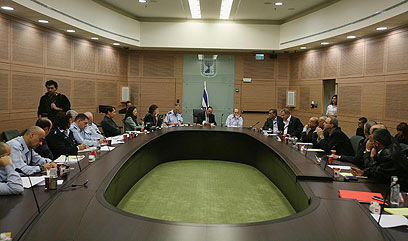
Knesset report: 60% of 2009 murder victims Arab
Data presented in Knesset Internal Affairs Committee show 71 out of 121 murder victims in 2009 were Arab. Last three years see increase in dimensions of crime within Arab sector. MK Zahalka accuses police of discrimination in treatment of cases
Knesset members discussed on Wednesday the issue of stemming the tide of crime within Arab society alongside worrisome figures showing a rise in crime within Arab towns. During the same time period, crime has dropped in Jewish towns.
Balad Chairman MK Jamal Zahalka, who summoned the discussion in the Knesset Internal Affairs Committee, said, "The year 2009 was the year of crime in the Arab sector. We want 2010 to be the year of the war on crime."
At the start of the discussion, MK Zahalka claimed that there is a gap in how crime is addressed in the Arab sector versus the general population. "Just like in every field, there is discrimination against us here, too. The criminals run wild because they know no one will catch them," he said.
Indeed, the figures presented in the report put together by the Knesset Research and Information Center for the discussion of police treatment of crime within the Arab sector paint a worrisome picture.
In 2009, the crime rate within the Arab sector rose 8.4%, while crime rates in the country overall dropped by 14.2%. The Arab sector crime rate has been on an upward trend for the past three years.
The figures also show that 60% of the murder victims in 2009 were Arab (71 out of 121); 41% of suspects in murder cases were Arabs; 36% of those detained for aggravated assault were Arab, as well as 36% of those suspected in robbery cases.
"These figures show the Arab population's relatively high representation in violent crimes relative to their part in the population," the report said.
Police chief: We increased forces
Police Commissioner Dudi Cohen, who praised the holding of such a discussion, addressed the figures and agreed that the situation is indeed grave. However, he added that the police "act as an emergency room for all society's problems."
"There are many officials along the way who need to address many societal issues so that these issues don't ultimately reach the police. The police live and breathe crime and violence 365 days a year. This important discussion of crime in the Arab sector does not only need to be from the police angle, but must be treated from an inclusive perspective, with the cooperation of all government ministries with the police just a link within this," he added.

Wednesday's discussion in Knesset committee (Photo: Gil Yohanan)
Cohen said that the police in the past two years have increased their forces in the north, where 44% of the country's Arabs live. He said that 500 policemen have been assigned to the war crime in the Arab sector.
MK Zahalka leveled criticism at the police's functioning: "There is severe discrimination. A murder that takes place in Kfar Kara is not dealt with the same way a murder in Tel Aviv is. What are you planning on doing in 2010 that wasn't done in 2009? The police must focus on the problem of violence within the Arab sector at the top of their priorities."
MK Gideon Ezra (Kadima), who served previously as the internal security minister, said, "Just as the police have an important role, importance is also given to the role of Arab leaders."
Rahat Council head and spokesman of the Arab municipal council heads Faiz Abu Siben joined in the discussion: "The absence of an alert mechanism is a central element for violence. The issue of violence is widespread in the Arab sector. Unfortunately, IDF weapons are used during brawls in Arab towns."
'Make a concerted effort'
According to the report, the increase in crime has its roots in a number of factors, including: disintegration of the family unit, the weakened status of the head of the extended family, a sense of alienation from Israeli society resulting from a low level of employment, land confiscation, and difficulties integrating into society.
"The existence of social and poverty gaps is many times spurs on violence," the Knesset report wrote.
The report also referred to the vision laid out in the Higher Arab Monitoring Committee's document that speaks of creating self-identity and definition as one of the main factors leading to the rise in crime rates. At the end of the discussion, the committee members called upon the police to make a concerted effort within a delineated time frame to decrease crime within the Arab sector.










